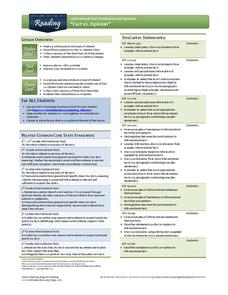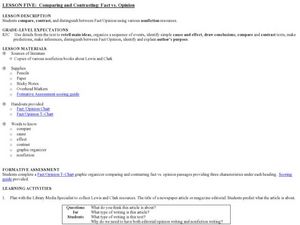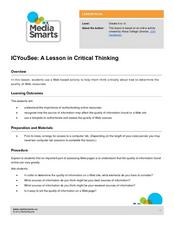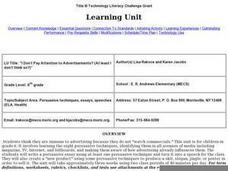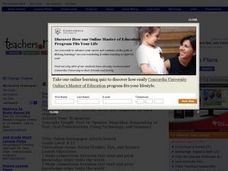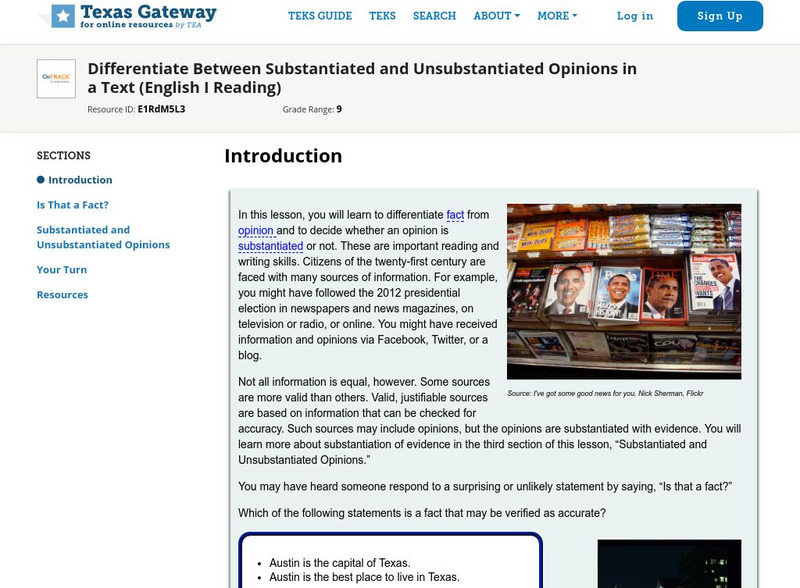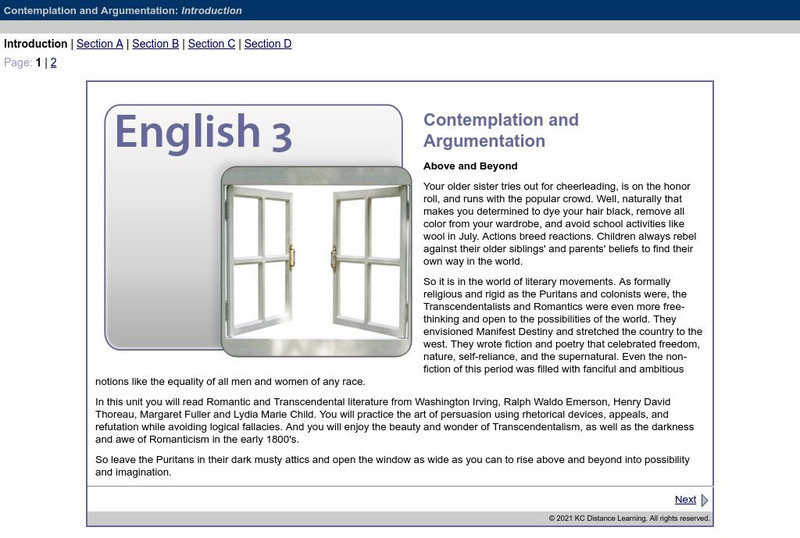Curated OER
Fact vs. Opinion (Part II)
How can you tell the difference between fact and opinion? Using newspapers, learners determine which articles contain statements of fact, and which articles reflect the writer's opinion. The lesson plan includes a discussion format and a...
For the Teachers
Fact vs. Opinion
Many informational texts are written as factual, but can your learners determine when an opinion is presented as fact? Have your kids read several articles on the same topic and record the statements that contain either facts or...
Curated OER
Comparing and Contrasting: Fact vs. Opinion
Elementary schoolers investigate nonfiction stories by analyzing facts and opinions. They read nonfiction stories about the Lewis and Clark expedition. Pupils utilize a T-chart to list the facts and opinions on opposite sides, and then...
Curated OER
Facts vs. Opinion (Part 1)
Provide pairs of learners with a three-page Fact vs. Opinion packet. The first page of the packet provides a definition of these terms and an opportunity for guided practice. Partners then share their ideas to complete the practice...
Curated OER
Fact and Opinion: How to Tell the Difference
Students explore reasoning by completing a worksheet activity in class. In this fact vs. opinion lesson, students identify the differences between a personal opinion and something that is factually true. Students identify several...
Scholastic
Reading Skills Profile
Assess your young learners' reading skills, from sounding out words to general comprehension and identifying facts vs. opinions, with this excellent worksheet. The resource also includes a goal-setting worksheet that focuses...
Curated OER
Fact vs. Opinion
Students explore fact versus opinion in reading material. They listen to sentences and use hand signals to identify if the sentences are facts or opinions. After reading a story, they vote on sentences for facts and opinions and stae a...
Curated OER
Amelia Earhart: Fact Or Myth
In this reading and history worksheet, students research Amelia Earhart and make lists of what they believe to be facts and what they think are myths, legends and theory. No information or examples are given on this page.
Curated OER
Turning Literature into News
Young scholars examine the newspaper. In this writing purposes lesson, students read the newspaper and discuss the purpose: to inform, entertain and persuade. Young scholars identify facts and opinions. Students write an article and...
Curated OER
ICYouSee: A Lesson in Critical Thinking
Stress the importance of authenticating online resources and understanding the sources of websites' information with this activity. Using a Web-based activity, the lesson prompts young learners to think critically about determining the...
Curated OER
Persuasive Writing: Creating Book Reviews
By reading and analyzing examples of persuasive text, students can get a better idea of how to form their own essays.
Curated OER
I Don't Pay Attention to Advertisements
Sixth graders examine the eight persuasive techniques, identifying them in all avenues of media including magazine, TV, Internet, and billboards, and making them aware of how advertising already influences them. They write an essay using...
Curated OER
"I Don't Pay Attention to Advertisements? (At least I don't think so?)"
Sixth graders study eight persuasive techniques that occur in a variety of media types. They write a persuasive essay and present it to the class. They create a "new product" for which they produce an advertisement using persuasive...
Curated OER
Online Newspaper Search
Pupils use the Internet to research an article. When they find an article they like, it be printed and they highlight the important information and present to the class.
E Reading Worksheets
E Reading Worksheets: Fact and Opinion Lessons
In this learning module, students will learn more about the differences between facts and opinions. A PowerPoint presentation and related activity are provided to reinforce the topic of facts vs. opinions. This module is designed to...
Texas Education Agency
Texas Gateway: Differentiate Between Substantiated and Unsubstantiated Opinions
[Accessible by TX Educators. Free Registration/Login Required] In this lesson, you will learn to differentiate fact from opinion and to decide whether an opinion is substantiated or not. These are important reading and writing skills.
Department of Defense
Do Dea: Contemplation and Argumentation
In this self-guided unit, you will read Romantic and Transcendental literature and you will practice the art of persuasion using rhetorical devices, appeals, and refutation while avoiding logical fallacies. By the end of the unit, you...

